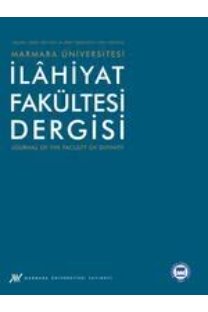Hüseyin Azmî Dede ve Beyânü’l-Makāsıd Adlı Risâlesi
Özet Bu makalede Gelibolu ve Kahire Mevlevîhâneleri şeyhi Hüseyin Azmî Dede’ye âit Beyânü’l- Makāsıd isimli yazma risâle ele alınacaktır. Müellifin hayatı ve eserleri hakkında bilgi verdikten sonra bu risâlenin günümüz diline aktarımı yapılacaktır. Beyânü’l-Makâsıd da tasavvufî anlayışta usûl ve usûl belirlemenin şartları, geçmişten günümüze âdâb ve erkâna yönelik esaslar ele alınıp tartışılmaktadır. Eser, XX. yüzyılda Mevlevîliğin tasavvufî hayat ve düşünce bakımından ne nok- tada olduğunu yansıtması ve ortaya koyması açısından önemlidir. Ayrıca eserde, Mevlevîliğin 1925’ten hemen önce denilebilecek bir zaman dilimindeki durumunu ve müellifin tasavvufî düşünce ve metodolojik tartışmalara yönelik fikir ve tespitleri ile bazı problemlerin çözümüne dâir önermiş olduğu çözüm yollarından bahsedilmektedir. Anahtar Kelimeler: Hüseyin Azmî Dede, Beyânü’l-Makāsıd, Mevlevîlik, Mevlevîhâneler, âdâb ve erkân. Abstract This article will study the treatise Bayânu’l-Maqāsid by Huseyin Azmi Dede who is the master of Gallipoli and Cairo Mawlavi Lodges. Firstly the biography and his works will be studied. Secondly the epistle will be transliterated in Latin alphabet. This treatise gives information on sufi methodology and the sufi manners from past to the time of the author. It further discusses how sufi methodology and manners are formed. This work is very important since it shows the conditions of Mawlavi order from the perspectives of sufi life and sufi thought. Just before the banning of sufi orders in 1925 this treatise gives important information as to author’s evaluation of sufi thought and sufi methodology and his solu- tions to the problems. Key Words: Hüseyin Azmî Dede, Bayân al-Maqāsıd, Mawlaviyyah, Mawlavi Lodges, Sufi manners, Sufi methodology, Mystical education.
Anahtar Kelimeler:
Hüseyin Azmî Dede, Beyânü’l-Makāsıd, Mevlevîlik, Mevlevîhâneler, âdâb ve erkân
- ISSN: 1302-4973
- Başlangıç: 1963
- Yayıncı: Marmara Üniversitesi
Sayıdaki Diğer Makaleler
Tanrı-Evren İlişkisi ve Mûcize Sorunu Açısından Determinizm, İndeterminizm ve Kuantum Teorisi
el-kıtal fî sebilillah ve tedâiyatyuhu ke şiarin islamiyyin
Fürû‘ Fıkıh Sistematiği Üzerine
“Arkasından Ağlanması Sebebiyle Ölüye Azap Edilir” Hadisine Sosyo-Kültürel Bağlamda Bir Yaklaşım
Râgıb el-İsfahânî’de İnsan Tasavvuru
Bağdat Eyaletindeki Atebat’a Şiî Cenaze Nakli ve Karantina (XIX. Yüzyıl-XX. Yüzyıl Başları)
“Homo Homini Lupus”: Thomas Hobbes’un Ahlâk Felsefesi Üzerine
Hüseyin Azmî Dede ve Beyânü’l-Makāsıd Adlı Risâlesi
